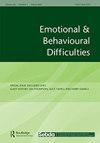遏制排他性的学校纪律:实施与文化相适应的积极行为实践
IF 1.5
Q3 PSYCHOLOGY, EDUCATIONAL
引用次数: 1
摘要
在过去的几十年里,美国公立学校的招生和师资队伍之间的差异越来越明显。来自不同背景的学生数量继续增长,而教育者队伍继续变得更加同质化。这种多样性的裂痕带来了一些挑战,影响了来自不同背景的学生的教育体验的质量,往往会产生有害的纵向结果,包括不成比例地使用排他性的学校纪律。大多数教育工作者培训方案继续在传统、过时的课堂管理做法方面培训未来的专业人员,这些做法引发的反应性行为往往导致停职或开除。这种做法不成比例地影响了来自不同背景的学生,尤其是黑人男性。然而,学校组织可以实施一些建议,以更好地准备他们的教师队伍,以满足学生的行为需求,而不是立即诉诸排他性的学校纪律。本文将讨论专业发展的选择,强调教育工作者的客观性(即,解决内隐偏见,无条件的积极关注)与循证实践(即,基于积极的行为管理,基于课堂的功能行为评估)相结合,可以纳入普通教育课堂。本文章由计算机程序翻译,如有差异,请以英文原文为准。
Stemming exclusionary school discipline: implementing culturally attuned positive behavior practices
ABSTRACT Over the past several decades, public schools across the United States have experienced an increasingly visible diversity rift between student enrollment and teaching faculty. The number of students from diverse backgrounds continues to grow while educator ranks continue to become more homogeneous. This diversity rift presents several challenges that affect the quality of educational experiences for students from diverse backgrounds, often to detrimental longitudinal outcomes including the disproportionate use of exclusionary school discipline. The majority of educator preparation programmes continue to train future professionals in traditional, outdated classroom management practices that invoke reactive actions often resulting in suspension or expulsion. Such practices have disproportionately affected students from diverse backgrounds, most conspicuously Black males. However, there are several recommendations school organisations can implement to better prepare their faculty ranks to meet the behavioural needs of students without immediately resorting to exclusionary school discipline. This paper will discuss professional development options that emphasise educator objectivity (i.e., addressing implicit bias, unconditional positive regard) in tandem with evidence-based practices (i.e., positive-based behaviour management, classroom-based functional behavioural assessment) that can be incorporated in the general education classroom.
求助全文
通过发布文献求助,成功后即可免费获取论文全文。
去求助
来源期刊

EMOTIONAL AND BEHAVIOURAL DIFFICULTIES
PSYCHOLOGY, EDUCATIONAL-
CiteScore
1.80
自引率
10.00%
发文量
10
期刊介绍:
The central intention of Emotional & Behavioural Difficulties (EBDs) is to contribute to readers" understanding of social, emotional and behavioural difficulties, and also their knowledge of appropriate ways of preventing and responding to EBDs, in terms of intervention and policy. The journal aims to cater for a wide audience, in response to the diverse nature of the professionals who work with and for children with EBDs.
 求助内容:
求助内容: 应助结果提醒方式:
应助结果提醒方式:


